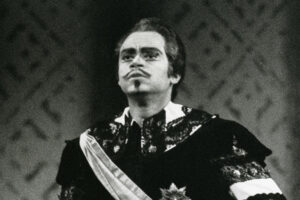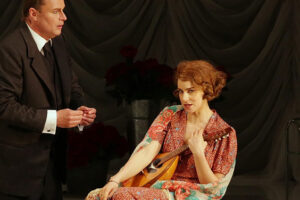
Of all of Verdi’s operas. Aida is the one I find least interesting dramatically. Compared to Don Carlos, Macbeth, yes, even Il Trovatore, Aida has a very old-fashioned libretto which could almost be a scenario for an 18th-century Metastasian opera seria; indeed Charles Osborn in his Complete Operas of Verdi maintains that a libretto called Nitteti by Metastasio and set to music by at least thirteen different composers was the source of the entire story of Aida.
The great Verdian scholar Julian Budden, however, dismissed this idea, pointing out that the plot is merely a love triangle, subject of countless operas, set against an exotic background of a culture which had captured the imagination of many due to the spoils of archaeological excavations in Egypt on display in numerous museums.)
The Khedive of Egypt, anxious to present the world premiere of a major work by a leading composer in his new opera house, which had opened in 1869 with Verdi’s Rigoletto,approached Verdi who was unenthusiastic at first. When the management told him “You are our first choice, but if you turn us down, we are going to ask Gounod and then Wagner”, Verdi showed more interest; contracts were signed in 1870 and the opera opened to great acclaim in 1871. Verdi did not attend the premiere or supervise the rehearsals and considered the Italian premiere at La Scala in 1872, in which he was heavily involved in the preparations at every stage, the opera’s real debut.
This DVD is part of the “Tutto Verdi” series, an admirable project to release all of the composer’s operas for his bicentenary this year. The performance comes from the Teatro Regio di Parma, which is associated with one of my favourite Verdi anecdotes.
In 1872, Verdi received a letter of complaint from a man who had gone to see Aida at the theatre in Parma, twice, as the first time he had not enjoyed it at all but felt he should try again. He still came to the conclusion, though, that the success of the opera was due merely to its spectacular scenery and could not stop thinking of all the money he had wasted on two tickets, two train fares and two dinners so sent Verdi a bill for these expenses.
Verdi wrote to his publisher RIcordi and told him to reimburse this music lover, but to deduct the cost of the dinners as “he could have eaten at home” and have the man send him a receipt and a written promise never to attend one of Verdi’s opera again as he could not afford to keep issuing refunds. The gentleman complied, received his refund, but was mortified when Verdi sent all this correspondence to the press, resulting in national ridicule.
What Aida lacks in dramatic originality is made up for, of course, by its magnificent and beautiful music and has long been one of my favourite operas. This performance from Parma in 2012 does not get off to a good start with scrappy playing by the strings in the exquisite writing for high violins in the prelude. The curtain rises on a rather handsome set of a colonnade on two levels, steps, and sliding panels covered in gold with hieroglyphics and bas-reliefs. Costumes are a mix of ancient Egyptian and Hollywood “Biblical”. A lot of the decoration and lighting is blue, and blue is even used as a basis for the Egyptian characters’ make-up, with most unfortunate effect on the poor Amneris who has a ghastly bluegreen tinge to her face all the way through.
Musically the performance is undistinguished, conductor Antonio Fogliani plodding his way dully through the score. Scene two of Act One, the ceremony of the consecration of the sword and Radames’ installation as commander of the army in the temple of Vulcan, a scene unique in Italian opera in its evocation of ritual and its blend of dance, singing and drama, does not make much of an impression with unimaginative and silly choreography (as is the rest of the dancing in the opera ).
Susanna Branchini as the heroine is the only one in the cast to make anything of the text she is singing. A very handsome woman with striking stage presence, she lacks the ability to sing sweetly and softly as the role requires at times, but has the power for the more dramatic passages and her performance is a pleasure to see and hear.
There is an adequate Amonasro from baritone Alberto Gazale—and now I have run out of nice things to say about the performers. Two wobbly basses, Carlo Malinverno as the King in a faux-bejewelled headdress that seems a size too big for him and wobbles along with his voice, and George Anguladze as the high priest Ramfis, have inaudible low notes and strained high ones.
Tenor Walter Fraccaro as the object of both the ladies’ passion sings all the way through in loud, unvaried tone, utterly devoid of colour or interest. His “acting” consists of stretching his arms out wide.
The disaster, though, is Mariana Pentcheva as Amneris, the most interesting character in the opera and of course one of the great Verdi dramatic mezzo roles. Sprawling languorously on a couch being fanned by slaves and calling voluptuously for her love to come to her at the beginning of Act Two, she looks risible and reveals a very worn voice, barely in tune. The great Judgement Scene of Act Four goes for nothing and she receives polite, tepid applause (which I suspect may have been edited anyway).
The director, Joseph Franconi Lee, appears to have done little beyond having extras march across the stage every now and then and arrange ludicrous poses for the principals at the ends of scenes. The camera pans across the chorus’ faces during the dreary Triumph Scene and reveals several of them mechanically singing their music, looking bored to death.
With so many great recordings and DVDs of Aida available, there is not much reason to choose this one. Avoid.

























Comments